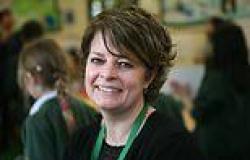Children are less likely to be diagnosed with autism if their parents take part in video-based therapy, a major study has found.
Experts hailed the 'landmark' finding, which suggests intervening when the brain is still malleable can improve social development.
The therapy, called iBASIS-VIPP, involves filming a child with early signs of having the spectrum disorder and their parents interacting. Parents then watch the clips with a practitioner to discuss the best ways to help them develop.
British and Australian academics discovered infants treated using the approach were two-thirds less likely to be diagnosed with autism at age three.
It improved the social development of youngsters and their autistic behaviours, such as being sensitive to bright lights and loud noises and repeating themselves.
But it didn't reverse the developmental difficulties of children who showed signs of having autism as a toddler. Although, researchers said spotting the signs earlier may help them develop.

Researchers in the UK and Australia used a treatment that involves filming babies aged nine to 14 months, who showed early signs of autism, and how they interact with their parents to determine how to best help their development
The study, carried out by researchers at Manchester University and the University of Western Australia, was published in JAMA Pediatrics.
Children are not usually diagnosed with autism until they are three.
Around one in 50 youngsters fall on the spectrum.
They can find it hard to make eye contact, understand how others feel, or have a keen interest in certain topics. Autistic youngsters may also take longer to get their head around information, or repeat things.
Doctors diagnose the disorder by assessing their development, such as when they started talking, watching how they interact with others and reading reports sent by their nursery or school.
Over the course of four years, medics examined 103 babies in Australia aged nine to 14 months who showed early signs of autism.
In babies, it can include not smiling, making eye contact or responding to their name.
Fifty babies received 10 video therapy sessions alongside normal care — which depended on what their doctor recommended. The others weren't given anything but standard treatment.






